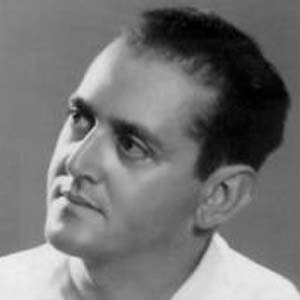Emanuel Zamir (1925-1962) was a central figure in the field of Hebrew song in the 1950s and among the founders of informal singing ensembles and public sing-alongs (“shira betzibur”). Born in Petach Tikvah on August 19, 1925, Zamir studied teaching at the “Hebrew Beit Midrash for Teachers” in Jerusalem, as well as linguistics, literature and Bible at the Hebrew University. It was during this period that he wrote his first popular songs: “Ha’Taleh” and “Erev Shach”.
After graduating, Zamir joined the IDF, where he was active in areas of education and culture. He formed various bands (among them “Chavurat Ha’esh” who performed “Alei Ha’esh” and “Dvekut Ha’chomer”) and founded the “Tizmoret Ha’chazitit” (Battlefront Orchestra), which later became the IDF Orchestra. He also served as the artistic director of IDF bands, among them the “Pikud Ha’Nachal Band” (Nachal Command, writing and composing the Nachal Command anthem “Magal Ve’cherev”), organized conferences for dance and song, and more.
Upon his discharge from the army, Zamir devoted himself to the dissemination of Hebrew song throughout Israel and in time became known for the visits he made with his pick-up truck to immigrant settlements, transit camps, Arab villages, Bedouin communities, and of course cities and settlements across Israel. Zamir performed his own songs as well as other Hebrew songs at each place he visited, established local singing groups and encouraged young talents, whom he invited to join him on his travels. In addition, Zamir taught in schools and youth movements, organized holiday ceremonies and special events to mark the anniversaries of cities and settlements (in honor of which he wrote and composed songs, among them “El Admat Lachish”, “Himnon La’rehovot”), founded and conducted local choruses and orchestras, hosted a radio show on Kol Israel, and recorded his own songs. In 1960, Zamir founded the “Israeli Song Movement”, which attracted thousands of members who had attended his song meetings. To this day, there are active singing ensembles that bear Zamir’s name.
Unlike most lyricists of the time, Emanuel Zamir composed the music for his own lyrics. The motifs of his songs, which were written in poetic, Biblical register, were primarily derived from the atmosphere of rural Eretz-Israel: landscapes, agricultural labor, shepherds and their herds, scouting, and campfires. Many of his compositions were influenced by local folk melodies as well as Arab and Bedouin melodies, and were written in modal and Mizrachi scales, with the flute, drums, and cymbals taking center stage. Zamir wrote many songs for “rikudei am” (folk dancing), which he considered to be the ultimate expression of the Chalutzim (pioneers) and Biblical legacy. Many of these songs shaped the text and rhythm of Israeli dance and are performed to this day.
Emanuel Zamir was killed in a car accident in July 1962.


10 thoughts on “Kaminos”
Was Nicholas related to Alexander Saslavsky who married Celeste Izolee Todd?
Anyone have a contact email for Yair Klinger or link to score for Ha-Bayta?
wish to have homeland concert video played on the big screen throughout North America.
can organize here in Santa Barbara California.
contacts for this needed and any ideas or suggestions welcomed.
Nat farber is my great grandpa 😊
Are there any movies or photos of max kletter? His wife’s sister was my stepmother, so I’m interested in seeing them and sharing them with his wife’s daughter.
The article says Sheb recorded his last song just 4 days before he died, but does not tell us the name of it. I be curious what it was. I’d like to hear it.
Would anyone happen to know where I can find a copy of the sheet music for a Gil Aldema Choral (SATB) arrangement for Naomi Shemer’s “Sheleg Al Iri”. (Snow on my Village)?
Joseph Smith
Kol Ram Community Choir, NYC
שלום שמעון!
לא שכחתי אותך. עזבתי את ישראל בפברואר 1998 כדי להביא את בני האוטיסט לקבל את העזרה המקצועית שלא הייתה קיימת אז בישראל. זה סיפור מאוד עצוב וטרגי, אבל אני הייתי היחיד עם ביצים שהביא אותו והייתי הורה יחיד בשבילו במשך חמישה חודשים. הוא היה אז בן 9. כעת הוא בן 36 ומתפקד באופן עצמאי. נתתי לו הזדמנות לעתיד נורמלי. בטח, אבות כולם חרא, אומרים הפמינציות, אבל כולם צריכים לעבוד כמטרות במטווחי רובה!
משה קונג
(Maurice King)
Thank you for this wonderful remembrance of Herman Zalis. My late father, Henry Wahrman, was one of his students. Note the correct spelling of his name for future reference. Thank you again for sharing this.
Tirza Wahrman (Mitlak)
amazing zchuso yagein aleinu, he wrote the famous niggun Lefichuch that is sung in almost every Israeli Yeshiva